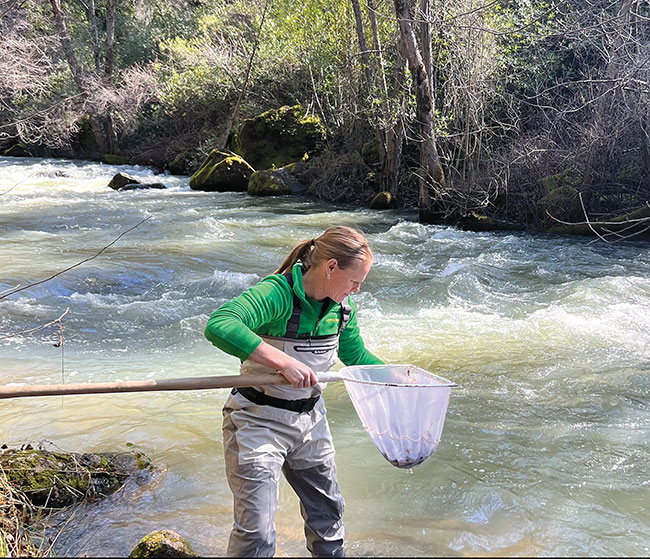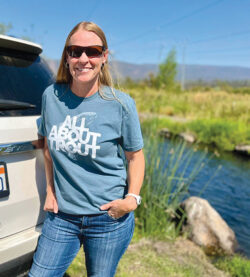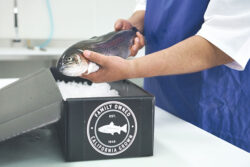
Carving a path for California trout
October 23, 2023
By Matt Jones
MT. Lassen California Trout & Steelhead president reflects on the evolution of the company
 Mt. Lassen California Trout and Steelhead’s various farm sites are all flow-through, reliant on natural water flows such as this one. Photo by Mark Thau
Mt. Lassen California Trout and Steelhead’s various farm sites are all flow-through, reliant on natural water flows such as this one. Photo by Mark Thau Mt. Lassen California Trout and Steelhead (MLCTS) will celebrate their 75th anniversary next year. A family business, Phil Mackey took the reins of the company nearly 50 years ago and his daughter, Katie Mackey Harris, grew up around the farms. Now, that family tradition continues as Mackey Harris has taken over as company president, and her daughters get to grow up around trout farms and learning about the ins and outs of the business. Mackey Harris spoke with Aquaculture North America about her career, the evolution of the family business and her experiences as a woman in the aquaculture industry.
THE ROAD BACK HOME
Like many people who grew up around a family business, Mackey Harris had a desire to make her own way in the world and didn’t plan on working at the farms initially. A softball scholarship took her to the University of Oregon, where she graduated with a degree in English literature and she then followed that up with a master’s degree in education. She spent several years as a teacher, but she soon felt the need for a change.
“Mainly, I started a family,” said Mackey Harris. “I wanted to be home with my kids when they were little, so I walked away from teaching. It felt like a good time to step back in, so I called my dad, who is the owner of the company, and said ‘I just need to get out of the house.’ I grew up on a trout farm. I’ve worked here, I’ve pumped plenty of fish poop when I was a kid and cleaned the office. That’s what I did growing up and then just to get out of the house and to get a little walking around money.”
Mackey Harris’ return to the company came at a time when there was a need for more help around the farms, however, and slowly she began taking on more responsibilities. She said it all felt very natural.
“I remember the first time I went to a trout farmers’ conference, I was sitting next to my dad thinking, ‘oh my goodness, these are our people!’” said Mackey Harris. “‘There’s other people like us!’ It was this goofy moment of like ‘yep, I’m home.’ I get to try to make decisions based on what’s best for our employees and what’s best for the fish. The small family aspect of it is what I love, and family means way more to me than just, obviously, my dad. I’m the president of the company, but the people that we work with, that’s my family. That’s what I love about what I get to do.”
A CIRCULAR EVOLUTION
All of MLCTS’ farms are built around natural flow-through systems around the base of the titular Mount Lassen – “We rely on Mother Nature and gravity to feed water to our fish,” said Mackey Harris. Though there are a few backup generators that assist during drought conditions, generally the systems are naturally fed. Each farm is custom built around the topography of the springs themselves – no two farms look the same at all.

“We don’t want to be the biggest, we want to be the best.”
– Katie Mackey Harris, president, Mt. Lassen California Trout and Steelhead
Photo courtesy Mt. Lassen California Trout and Steelhead
“It’s all kind of a beautiful mess, as I like to call it,” said Mackey Harris. “We’ve got all these little farms spread out all around the base of Mount Lassen that are spring fed. The water temperature comes out at a very consistent rate 365 days a year. We’re all over, we’ve got a big fleet of vehicles that we use to get to all these farms. And we generally have 20 to 23 employees.”
The majority of fish raised at MLCTS are sold live to recreational fishing efforts within the state. A significant portion of their vehicle fleet are used to deliver thousands of pounds of fish across the state with only 20 per cent of sales going to high end restaurants and other premium markets.
Much like Mackey Harris’ career path eventually brought her back to the family farm, she said the evolution of the farm has also been circular. Over the years, the company has dabbled in a variety of different species, such as catfish, but ultimately they keep coming back to their staple – rainbow trout, and maximizing how they utilize the pristine waters that are available at their various farm sites.
“In just the last couple of years, we put in our own processing plant for the seafood side,” said Mackey Harris. “It’s a separate company, but we made that commitment to controlling quality on the seafood front. So that’s been an evolutionary process. And we continue to do genetic selection – we have our own broodstock, we have our own strains. And so we continue to hone in on those and make sure we’re bringing the best of the best for our future progeny.”
Another limiting factor regarding diversifying their operations is an unreliable power grid. Every summer and winter they have several days without power on site. With their farms relying on natural flow-through water, power outages have limited impact on their existing system, but no matter how many tales she’s told about how many more fish could be raised in a recirculating system, she knows that the logistics simply don’t support it.
“Our power is disturbingly unreliable where we live,” said Mackey Harris. “So that’s kind of a non-starter for us. We’re pretty committed to where we are and what we’re doing. We don’t want to be the biggest, we want to be the best.”
Given that reliance on natural water flow, Mackey Harris is acutely aware of the impacts of climate change. In the last ten years, they had to deal with drought conditions in at least seven of those years. And while there is very little they can do to directly address those issues, they do their best to mitigate the impacts.
“It makes us better farmers,” said Mackey Harris. “It’s made us have to be more cognizant and make sure we’re not wasting water, to make sure our infrastructures are as sound as they can be. So we try to make sure we’re doing the best we can to take care of the animals we’re responsible for.”
AS A WOMAN IN THE INDUSTRY
Mackey Harris said that she greatly appreciates that she seldom has to think of herself in the specific frame of being a woman in the aquaculture industry. From working at her own company to board meetings with the U.S. Trout Farmers Association – where she previously served as president – she has always felt that she was judged by what she brought to the table.

A relatively recent addition for the company is a processing facility, which allows them an increased level of quality control over their end product.
Photo courtesy Mt. Lassen California Trout and Steelhead
“I never felt like I was a woman in a man’s world,” said Mackey Harris. “I just felt respected from day one. Am I usually outnumbered? Yeah, but that’s not anything I’ve ever been threatened by. I feel like I’ve only ever been judged by what I can contribute, period. Do we need more women in this industry? Absolutely. But I have never felt like it was a barrier for me. I’ve always felt respected by men who have been in this industry.”
Given that women are underrepresented in the industry, Mackey Harris acknowledges that her experiences may not be typical – she operates in a relatively small bubble, which could be a particularly supportive one for female participation. But she does love to tell her story and to help guide young women who are interested in following a similar career path.
“I do tours with the local Future Farmers of America (FFA) and I always talk just as much to the girls as I do to the boys and I try to connect with everybody,” said Mackey Harris. “I think one thing we probably don’t do well enough here in the States is reach out to our younger generation, particularly in the FFA. I think that’s an area where we could do a better job of reaching out, to talk about our industry and talk about aquaculture. We could have a table at the national convention for the FFA and get the next generation involved in aquaculture.”
Just a week before speaking with ANA, Mackey Harris had two of her daughters’ friends in the car and they mentioned they were interested in becoming veterinarians. They were both surprised to learn that vets play a crucial role in aquaculture operations – another opportunity to tell her story, the story of the business and the wider industry.
“I’m thankful to work in an industry where what I do is valued more than who I am, or what gender I am or my last name,” said Mackey Harris. “I just have to do my job and that’s what people care about.”
Advertisement
- Thurston County judge rules Washington’s net pen ban has ‘no legal effect’
- ANB releases calibration-free pH sensors





